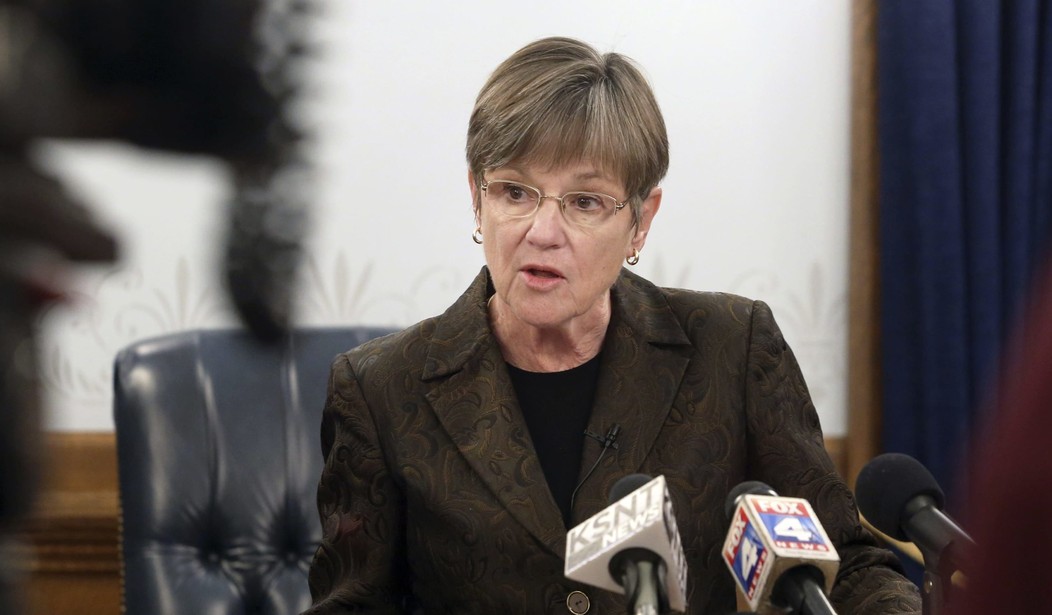What a difference a Democrat makes. At least that’s what groups like Equality Kansas and Freedom for All Americans hope, and organizations such as Family Policy Alliance of Kansas dread.
The Democrat in question is state Sen. Laura Kelly, who will be sworn in as the state’s new governor in January. Kelly made her political name fighting former Gov. Sam Brownback on issues like welfare, foster care and LGBTQ rights.
Now that he’s out and she’s in, Kelly promises to renew the battles and is confident she and her Democrats, along with a few moderate Republicans, can win.
While other candidates were lauding their outsider status, Kelly told voters before the Nov. 6 election they should support her for precisely the opposite reason. Kelly said she was an insider who knew how Kansas politics worked and what it would take to undo what Brownback had done.
“I don’t think this is time for another experiment. I think people need the reassurance that the person in the governor’s office knows where the problems are and knows how to solve them and can bring people together to do just that,” Kelly said to the Wichita Eagle in July.
At the top of her 2019 agenda, Kelly said, is restoring legal protections to LGBTQ state workers and doing what she can to stand in the way of a new law that allows Kansas adoption agencies to refuse to work with same-sex couples.
As far as protecting LGBTQ workers from discrimination, Kelly said she wouldn’t even wait for her first day in office to restore a 2007 executive order, from former Democratic Gov. Kathleen Sebelius, that Brownback rescinded.
“I am planning to actually have an executive order drafted before I take office” to take action as soon as possible, Kelly said.
Undoing the law that conservatives say is intended to protect the religious freedoms of faith-based adoption agencies is sure to be more contentious.
Under the law, the state can’t force an adoption agency to place kids in homes or situations that violate the agency’s religious beliefs. And the law also prevents the state from denying licenses or state reimbursement for placement solely because of the agency’s religious beliefs.
LGBTQ activists call the adoption law discriminatory. Conservatives consider it a rule that respects the religious freedom of adoption agencies that have a problem with gay marriage.
Kelly, being a political insider, has decided that instead of trying to overturn the adoption law, she’d explore options for not enforcing it.
“If there is a way to direct the agency to not implement that, then I will do that,” Kelly said during a news conference, the first time she met with reporters since winning last week’s election.
Tom Witt, the executive director of Equality Kansas, applauded Kelly’s strategy during a conversation with the Associated Press.
“There are a number of unconstitutional laws on the books that aren’t being enforced,” Witt said. “The (state’s same-sex) marriage ban comes to mind.”
Chuck Weber, the Catholic Conference’s executive director, told AP that he and others who support the adoption law would fight Kelly every step of the way.
“This is not a surprise, that Gov.-elect Kelly would try to circumvent the will of the people of Kansas to advance her own radical agenda,” said Weber, a former Kansas House member.
Eric Teetsel, the president of Family Policy Alliance of Kansas, also promised that Kelly would face all the resistance he could muster.
“During her campaign, she pledged to roll back protections for the unborn and faith-based adoption and foster care ministries, which would be consistent with her long record of opposing the values most Kansans hold dear,” Teetsel said in a statement. “Family Policy Alliance of Kansas will never stop fighting for those values, no matter who sits in the Governor’s office.”
But Kelly claims to have the backing of a bipartisan coalition of Kansas voters behind her, along with “a wave of common sense” that she rode to victory.
Senate Minority Leader Anthony Hensley, a Democrat from Topeka, thinks some moderate Republican lawmakers might be open to compromise because of the 4.5 percentage point margin of Kelly’s win.
“It sends a signal to people that we’re going to have a period of bipartisan coalition building,” Hensley told the AP.
Optimistic as Hensley and the governor-elect may be, Kelly faces the reality of dealing with a Republican-dominated legislature, lawmakers who aren’t expected to support what many GOPers see as being outside the mainstream.
Even the No. 2 Democrat in the Kansas House, Rep. Stan Frownfelter, pointed out that up to 60 solid votes would come from conservative lawmakers. That’s three fewer than Kelly would need to pass new legislation or block current state laws.
“It’s going to be tougher,” Frownfelter said.
If the fight over religious freedom vs. LGBTQ discrimination comes to a head in a Kansas courtroom, or even before the U.S. Supreme Court, Weber can’t imagine losing.
“We were very careful in drafting that bill, in dotting ‘i’s and crossing ‘t’s,” Weber said, “and making sure that this would pass constitutional muster.”









Join the conversation as a VIP Member